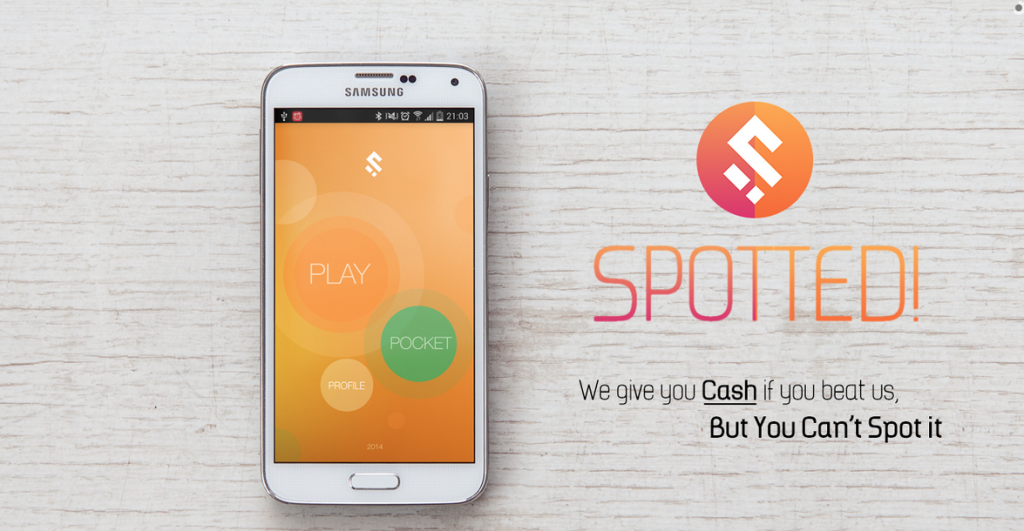Let’s be serious, everyone hates advertisements. They take up precious seconds before each YouTube video, clog up our websites, disrupt our television programmes with annoying cliffhangers.
Well, someone’s managed to make them fun.
Enter Spotted, a mobile game that would keep you hooked. Essentially it is a spot-the-difference game but with advertising photos, thus making them fun and interesting (and in addition, less annoying). But the real draw of this game is that it doesn’t pay you in useless virtual points, but with the beauty of cold hard cash. And who doesn’t love an app that pays them to use it?
Spotted is the brainchild of Xavier Ng and Tan Yingchun, and brought to life by ‘technical founders’ Nguyen Tuan Viet and Benjos Antony. Currently undergraduates in Singapore Management University, the four banded together to create an app that is somehow able to make advertisements ‘belong’ in your life, while not disrupting it.
“Whatsapp’s founder Jan Koum believes that ‘no one wakes up excited to see more advertising, no one goes to sleep thinking about the ads they’ll see tomorrow’. Here at Spotted, we believe in that too,” says Xavier Ng. “No one wakes up excited to see these advertisements, because they were never the reason people go to social network platforms for.”
When asked about their inspiration, Xavier told Vulcan Post about Foldit, a protein-folding game that solved a molecular puzzle that stumped scientists for years. Being fans of games themselves, with Xavier being an avid mobile game player and Yingchun spending his time in the library playing Dota 2 (tsk tsk!), they understand how games are able to transform something mundane into something addictive.
“If something as mundane as genetic research can be made fun and enjoyable, why not advertisements?”
— Spotted founders
Flappy Bird’s Level Of Annoying, BUT There’s Money
The game sounded simple enough. All you have to do is look at a displayed picture first, then when you’re ready tap the button below to open up the next screen. It will then show you a modified version, and you get three tries to spot three differences. If you get one right, you get 10 cents. Two right, and you get 20 cents. All three right and you get 50 cents! The game is over in less than a minute.
On my first try I was feeling pretty amused that I was scrutinizing an advertisement for meal sets this closely, but altogether pretty confident. But after pressing the ‘Ready’ button, my original perception quickly changed. I could see no differences, and my first two taps came up red – no matches. I started cursing myself for not remembering the name of the chicken ham and cheese lunch set, or the way the restaurant logo looked like. Out of a lucky break I scrapped past with one match, and scored myself 10 cents.
As tiring and incredibly frustrating this game was, it made me want to keep playing simply because I kept scoring 10 cents out of each game. One game I came out with 20 cents, and I felt really tempted to keep playing. The worst part? You only get to ‘cash out’ once you hit a $1 minimum, which means if you don’t at least win the game at its lowest score 10 times, you get nothing.
This game is as shrewd as Flappy Bird, except you get money for each pipe you fly over. It brings out the innate Singaporean-ness in me that hates losing at anything, especially anything that has to do with money.
In short, the game is perfect.
The Answer To The Death Of Advertising?

The difficulty level of this game is enough to make you actually pay attention for once to the advertisements they’re flashing at you. I have never looked this closely at and scrutinised a promotion for restaurant deals unless I’ve already planned to eat there. In getting people to look at the advertisements, and possibly remember them, the game is gold. However whether it gets you to have good feelings about the advertisments is subjective, though to be fair, you probably have never felt positive about crappy web-based advertisements anyway.
It definitely helps to ingrain the message into players’ minds, especially once the pictures start replaying itself after a few plays. In fact, if players see an advertisement they like or a deal they are interested in patronising, they are also given the option of putting the adverts into his “pocket” to look at later.
It’s unlikely that the mobile game industry has space to expand on this idea enough to eliminate unwanted ads altogether, but Spotted does a really good job at selling the message. And even though they technically share a part of their advertising profit with the users, the difficulty of the game is enough to still keep them a tidy profit. It’s win-win-win for everyone!

My only concern for this game is cheating. The game is definitely not cheat-proof, and with this difficulty level, it’s impossible to resist the temptation to do so. However, cheating is really frustrating and tiring to do so, and I’m not dedicated enough to earn an extra 40 cents more for the amount of effort I put in to cheat the system. But I won’t discount others by saying the same thing about them.
The only fail-safe for this at this point is that the game only earns you small incremental sums, and unless you have no life and are adamant in earning money in deceitful yet mind-numbing ways, you probably won’t be able to cheat too much out of this game. Developers should probably look into better fail-safe methods though.
I’m personally horrible at spot-the-difference games, so I can honestly say that one train ride to work by a decent player would be enough to reward yourself to a morning kopi. If not, it’s still a fun game, with small yet visible rewards, which makes it less of a waste of time than other mobile games that take your money instead. So if you need another game to get addicted to, get this one.
Spotted is available on iTunes and Google Play.


















